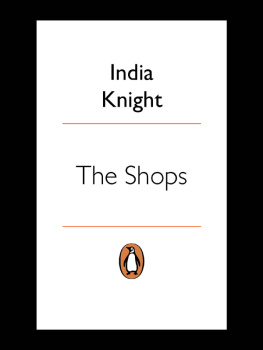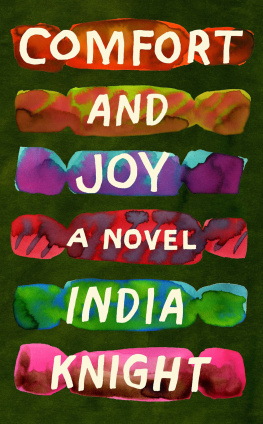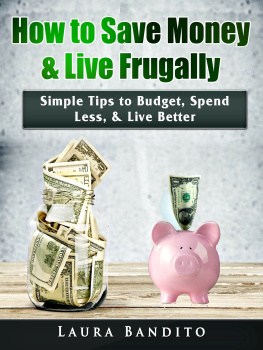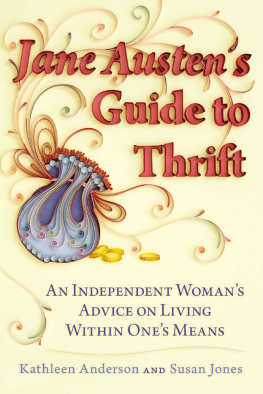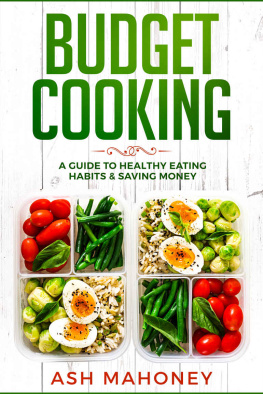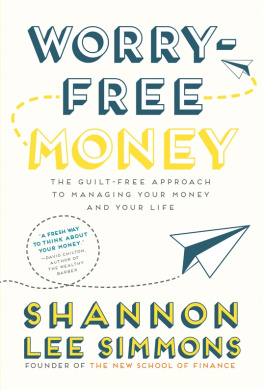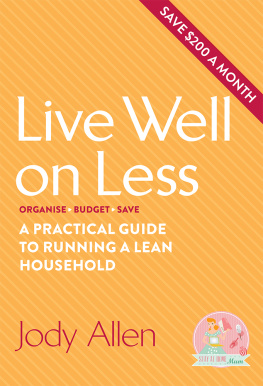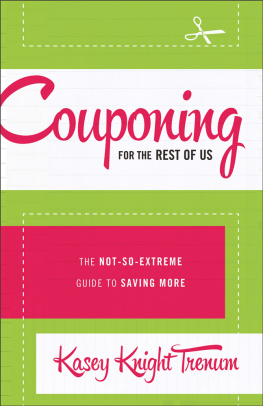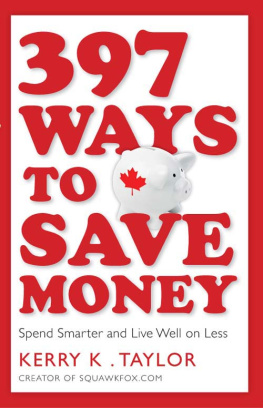The Thrift Book
Live Well and Spend Less

India Knight

PENGUIN BOOKS
PENGUIN BOOKS
Published by the Penguin Group
Penguin Books Ltd, 80 Strand, London WC2R 0RL , England
Penguin Group (USA) Inc., 375 Hudson Street, New York, New York 10014, USA
Penguin Group (Canada), 90 Eglinton Avenue East, Suite 700, Toronto, Ontario, Canada M4P 2Y3
(a division of Pearson Penguin Canada Inc.)
Penguin Ireland, 25 St Stephens Green, Dublin 2, Ireland (a division of Penguin Books Ltd)
Penguin Group (Australia), 250 Camberwell Road,
Camberwell, Victoria 3124, Australia (a division of Pearson Australia Group Pty Ltd)
Penguin Books India Pvt Ltd, 11 Community Centre,
Panchsheel Park, New Delhi 110 017, India
Penguin Group (NZ), 67 Apollo Drive, Rosedale, North Shore 0632, New Zealand
(a division of Pearson New Zealand Ltd)
Penguin Books (South Africa) (Pty) Ltd, 24 Sturdee Avenue,
Rosebank, Johannesburg 2196, South Africa
Penguin Books Ltd, Registered Offices: 80 Strand, London WC2R 0RL , England
www.penguin.com
First published 2008
1
Copyright India Knight, 2008
Illustrations copyright Debbie Powell, 2008
The moral right of the author has been asserted
All rights reserved
without limiting the rights under copyright
reserved above, no part of this publication may be
reproduced, stored in or introduced into a retrieval system,
or transmitted, in any form or by any means (electronic, mechanical,
photocopying, recording or otherwise), without the prior
written permission of both the copyright owner and
the above publisher of this book
978-0-14-190329-3

Thanks to Andrew, whose prescient idea this book originally was, and who once tried, thriftily but unsuccessfully, to get my children to play with peg dolls (See they wee pegs? Thats all youse need tae play fer ooers. Hey! Come back! Och, youse are spoilt wee bastards, just like yer maw). Huge special thanks to lovely Sophia for feeding and clothing said children while I typed, and for providing them with better play materials. Giant thanks also to Laura Wheatley for being an ace researcher; to the unbeatable combo of Georgia Garrett and Juliet Annan for everything; and to Jenny Lord for her help, insight and dazzling efficiency. And thank you to Sarah Fraser for this beautiful design, and to Debbie Powell for her wonderful illustrations.
Introduction
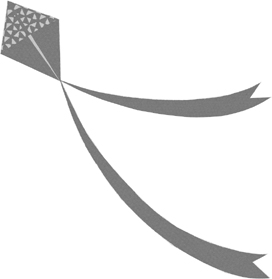
To say Ive never found the idea of cutting back particularly appealing would be something of an understatement. I am naturally extravagant; I am also naturally spectacularly crap with money, regardless of how much or how little of it I earn. Its an unhappy combination that has, for two decades, resulted in complete dependency on my overdraft facility and on assorted loans, and in long periods of a panic-denial-panic cycle. Lets just say Ive come across my fair share of bailiffs over the years (one year they appeared on 23 December, which was nice. I was out shopping). When it comes to money, I am Fiddling While Rome Burns made flesh. Or rather, I was.
In 2007, before I decided that I really needed to get a grip once and for all, I was served with bankruptcy papers not for the first time, but for the most inescapable, disastrous one. I had two books in the Top Ten bestseller charts at the time. Its not that I cant earn money, or that I dont earn enough of it. Its a complete inability to manage money, full stop and, to be frank, an inborn lack of interest in doing so: money, schmoney; sometimes you have it, sometimes you dont whatever (its perhaps no coincidence that my father died a double bankrupt and that my mothers attitude to money is, shall we say, quite breezy). This romantic and deluded view works fine(ish) if theres just one of you, but it has rather limited appeal if you have a family children to clothe, food to put on the table, bills to pay because if you dont the baby gets hypothermia, that kind of thing.
Ill get back to all of this in the relevant chapter, but I think, embarrassingly enough, that, genetics aside, my calamitous approach to finances stems from some bizarre notion that I was too creative, too carefree (ha!) to concern myself with the rather naffly bourgeois issue of money management. Just as I used to see being fat as being indicative of having a wonderful appetite for life (as well as buns), I think I subconsciously saw my financial idiocy as a sign of a rather charmingly bohemian easy-come-easy-go approach to life in general. I know: its pathetic. Also, I am forty-two years old. Ive got over lying in the bath pretending to be Ophelia, but, clearly, not over thinking money is, like, really, really square.
I share all of this rather intimate information to pre-empt the obvious accusation about my writing this book: i.e. that its all very well for a well-paid, relatively successful middle-class person who lives in a lovely house in a lovely corner of London to write about thrift pull the other one, Marie Antoinette, its got a Svres cowbell on. But actually, my investigations into and eventual embracing of thrift have their roots in necessity. It dawned on me that nothing was going to improve unless I made fundamental changes to my spending habits. You may not have been served with sinister legal papers or become blas about bailiffs, but its a rare bird these days that doesnt feel a little belt-tightening might be in order, what with recession, mortgage rates, the credit crunch, the rise in the cost of living, and the disconcerting feeling that your profession and income ought to result in a rather more comfortable, less stressful lifestyle than your current one.
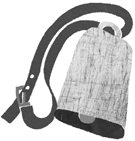
Walking-money-disaster aside, my new-found love of thrift also has its roots in a strange and unfamiliar feeling that has been creeping up on me incrementally over the past few years. I am a child of the 1980s: I believe in consumption, conspicuous or furtive. I love shopping so much that I wrote a whole book about it.why not macram your armpit hair while youre at it, loser? We were (much too) proud of our cash and of the things it could buy, even if, in retrospect, our attitude smacked rather embarrassingly of defensiveness and disengagement: well, I earn more than you, so that must make me better than you, right? (Wrong, wrong, wrong, and incredibly twattish to boot, though much of my generation couldnt see it at the time.)
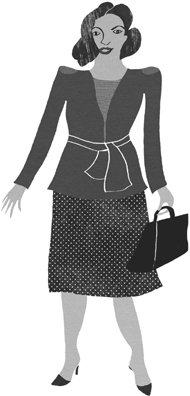
But anyway, hippie-contempt aside, as the years passed even I succumbed to imperceptible greening my older children, by the way, were miles ahead of me on this one, and my four-year-old sips her carton of juice and then sticks it in the recycling bag without being asked. I started finding myself peculiarly irritated at the amount of plastic used in supermarket packaging. You know the kind of thing: you want apples, but the apples come in their own pre-moulded plastic tray, with a layer of pre-moulded plastic foam to protect them from bruising, as though the journey home involved riding bareback through the Kalahari. Then I got a bit of a bee in my bonnet about plastic bags, because I kept seeing them depressingly out of context: on beaches, in trees, in the sky, on water. And because I read all the papers every day for my job, then I thought that it was really pretty shameful and just plain


